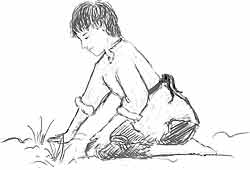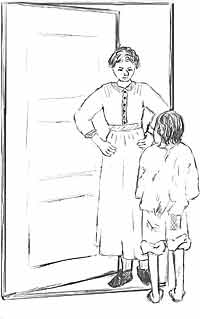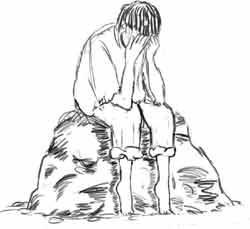The Little Gardener
Not many years ago, a man came over from Ireland, and settled in Boston. He was a gardener, and his name was Alex Murphy. He was very poor, but he was very honest. He loved to work in the garden, and nothing pleased him so much as to plant seeds in the ground, and see the plants grow when they came up.

This poor Irishman had lost his wife before he came to Boston. But he had one son, Peter. Peter was a good child, and loved very much to work in the garden with his father. He had a little spade, with which he dug up the ground, and a little hoe, with which he destroyed the weeds. He would lay out the ground in beds, and these he would plant with seeds. In a few days, these seeds would shoot up from the ground, and then little Peter would spend his time in pulling up the weeds, and in loosening the ground around his plants.
He was very fond of flowers, which he would grow in earthen pots. He had roses, pinks, daisies, myrtles, and many other things. Some of these were very beautiful, and Peter loved them almost as much as if they had been his brothers and sisters. He spent whole days in taking care of them, and was never so happy as among his flowerpots, and his little beds in the garden.
Peter’s father was very glad to see his son so industrious, and so fond of gardening. He told him about the God who had made the lilies and roses. As they worked together, cultivating plants and flowers, Peter learned about the kind Father in heaven who cared for them.
Thus the father, though he was poor, was happy, and Peter, though his feet were bare in summer, and though he labored all day, knew no sorrow. But at length the poor Irishman was suddenly taken sick, and died. Peter now had neither mother nor father. He had indeed no friends, and the people whom he knew were too poor to take him in. He was taken care of by an old woman for a few days, but she was no longer able to find enough food for him, and so he had to leave her.
He was very young, and now he was destitute of everything. His little straw hat was worn out, and he had nothing to wear upon his head. His shoes were gone, and, though the weather was growing cold, his feet were bare. His clothes, too, were thin. The morning after he left the old woman, he wandered about the city, not knowing what to do. He shivered, and his teeth chattered with cold.
He went along in the streets for some time, and met a great many people, but he did not dare to speak to them. He was very hungry, for he had eaten nothing the day before; but he did not know how to beg. He wandered about for several hours, till at length he came to a baker’s shop. The windows were filled with gingerbread, and everything that was good to eat. He put his little foot upon the step, and was about to enter, but the baker looked so sharply at him that Peter was too afraid to ask for anything, and so went away sadly.
As he walked, he passed through some of the finer streets, looking wistfully at the nice things he saw in the shop windows. But he had no money, and he felt all alone.
By now he was starving with hunger, and he resolved to enter some house and ask for a piece of bread. He came to a large house belonging to some rich man. From the sidewalk he could look down into the kitchen, which was below the main floor. Here he saw plenty of food, and as he approached the window, the steam of meat, and the flavor of pies and cakes, met his nose. Surely, thought the little boy, the people here have so many good things, that they will not refuse me a crust of bread.

With this idea he ventured timidly down the steps, and knocked on the kitchen door. He there met a woman, and timidly asked her to give him something to eat. He told her his sad story, and pled with her to save him from being starved. But the woman had a hard heart, and would give him nothing. In vain did the little boy plead for a single crust of bread. This was refused, and the woman sternly commanded him to leave at once.
Sad, and almost brokenhearted, Peter left the place. He was now ashamed to be seen in the crowded streets, so he retired to a remote part of the city. Here he walked about in the narrow lanes till evening.
When it was dark, he sat down upon a stone, and gave himself up to grief. He was chilled with the cold night wind, for his head and feet were bare, and his clothes were very thin. It soon began to rain, and at length it fell in showers. Peter was wet to the skin. But he had nowhere to go, so he continued to sit upon the stone.
“Oh, Father in Heaven,” he prayed, “remember little Peter and take care of him, for Jesus’ sake.” And so, with his head leaning upon his hand, he remained for a long time, trembling with the wet and cold. He thought of his poor father, and of the happy days he had spent in attending his flowers. He thought of his mother, too, whom he remembered very well, though she had been dead two years.

And now, for the first time, he began to weep. No one saw him, for it was very dark, and few people passed along the narrow street. His tears mingled with the rain that ran down his cheeks, and his sobs were lost amid the pattering of the water that fell from the houses.
But there was One to hear. The kind Father in heaven was watching over the poor boy who sat in his lonely and desolate situation. About nine o’clock, a man was passing by the place where Peter sat. It was so dark that he saw nothing, but he thought he heard the voice of someone in distress. He stopped and listened. He then distinctly heard the sobbing of a child.
At this moment, someone happened walk by with a lantern. The light shone on the little boy that was sitting alone upon a stone. The kind-hearted man was touched with pity, for he saw that the child was weeping, and that he was exposed to the cold night air and the drenching rain.
He approached, and asked the boy why he was there. Peter told him his story, and the good man wept in sorrow. “But come with me, my boy,” said he, “come with me. I will take you to a warm room, and I will give you food. Come with me, and if you are a good boy, I will be your father, and you shall want for nothing.”
“Oh, kind sir, I know God has sent you,” Peter said gladly. He took hold of the man’s hand, and trotted along the pavement with his bare feet. They soon reached the house, and Peter warmed himself by a good fire. He had then a bowl of bread and milk, and afterwards was provided with a warm bed.
As he lay down, he thanked his Father in heaven, who had thus turned his sorrow into joy; and his heart was full of gratitude to the kind man who had brought him home to his house. After a night of sweet sleep, Peter woke up, and again gave thanks to God.
I need hardly tell you the remainder of Peter’s story. He lived with the man who had brought him home, and, by his good conduct, won the favor of all who knew him. When he grew up, he chose to be a gardener; and, as he was very industrious, he saved up a good deal of money, and built himself a small house. By the side of it was a neat little garden, where he raised vegetables and flowers. These he would sell; and thus he lived very happily. And so, my little reader, you can see how the loving Heavenly Father cares for those who will put their trust in Him. Anyone, however poor, may be happy like this little Irish boy.